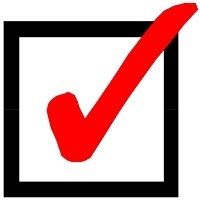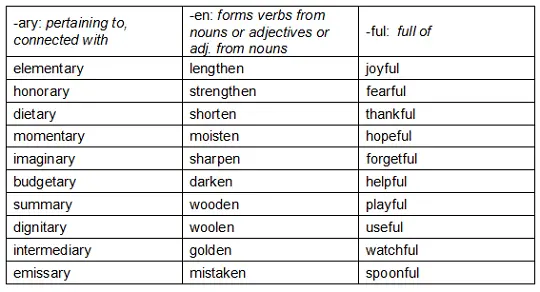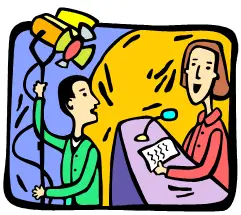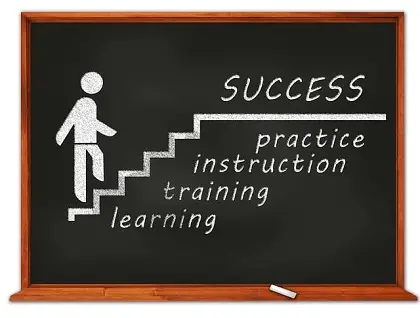Spelling Training
Here's a customized spelling training to improve your spelling skills. You're in the right place to become a better speller!
Begin by assessing your greatest needs. This spelling trainer checklist contains key skills that will help boost your spelling expertise.
Click through to find the specific training tips for your own spelling needs. Follow all links to free PDFS, supplementary articles and resources.
1. Learning common spelling rules, and frequent exceptions
2. Understanding common prefixes and suffixes
3. Doubling or not doubling final consonants when adding suffixes
4. Excelling at frequently misspelled words
5. Gaining memory tricks for difficult words
6. Recognizing common spelling patterns
7. Mastering homophone confusion
8. Knowing even more ways to build spelling skills
Spelling Training
Let’s begin your spelling training. Remember to focus on the points where you need the most help. It’s fine to skip ones in which you already have mastery.

Spelling Rules
Training: Rules are not consistent, as you know, and there are plenty of exceptions. Here are some rules you should know.
1. Compound Words
Keep both words whole. Don’t drop the last letter of the first word or the first letter of the last word. Examples: roommate, bookkeeper, sidewalk, withhold.
2. Words spelled with ie
or ei
Use i before e except after c or when
sounded like a as in neighbor and weigh. Examples: friend, believe, ceiling, receive, eight, vein Note: There are many exceptions to this rule,
including: neither, science, their,
weird, ancient, height, protein, sufficient and more. These words need to
be memorized.
Forming Plurals
3. Words that end in y
A) If a noun ends in a consonant followed by a y, change the y to i and add es.
Examples: candies, stories
B) If a noun ends in a vowel followed by a y, add s.
Examples: chimneys, turkeys
4. Words that end in f or fe
Most nouns ending in f or fe form the plural by changing the f or fe to v and adding -es. For a double f, just add s. Examples: calves, wives, knives, bluffs, cliffs, hooves.
Exception: roofs
5. Making plurals from words that end in o
A) If a vowel comes before the final o, add s. Examples: radios, studios
B) If a consonant comes before the final o, usually add es. Examples: potatoes, echoes
The plural forms of mosquito and tornado can be spelled either way.
This free printable guide contains a total of 12 common spelling rules, including the ones on this site. Expand your spelling training by learning them all.

Common prefixes and suffixes
Training: This website has a terrific list of 50 common prefixes in English, along with meanings and examples. Head on over to start learning the ones you don’t already know.
Here’s my own page that has free printable lists of 24 suffixes with examples, like this one:


Doubling and not doubling final consonants when adding suffixes
I’ve written an entire free PDF step-by-step lesson to train you in this invaluable skill. After you've completed that spelling training, you'll know which of these are spelled correctly, and which of these are incorrect: occuring, sitting, forgoten, nodding, transmitter, referred.

Commonly misspelled words
Training: Some of the most important ones to master are because, a lot, definite, friend, doesn’t, necessary, occasion, separate, sincerely and tomorrow. If you’ve mastered these ten words, check out my free PDF lists of 102 frequently misspelled words, such as rhythm, scissors, conscience and more. You may also need to work on these spelling demons which are commonly confused words like accept and except. Get the free PDF lists on those pages. For a mega-list, check out this list of 300 commonly misspelled words, complete with a free printable page!
Study these on your own or with a friend until you’ve conquered them all!


Memory tricks, also know as mnemonic devices
Training: A mnemonic device can help you remember your biggest spelling demons.
One example of a mnemonic device is a sentence or a phrase that contains a word for each letter in the word you’re trying to learn. For example, if you're prone to mistakenly write/type becuase, try this. As you write the word, say to yourself,
" 'Be calm and useful, says Ed.' "
The first letters of the words in this phrase will remind you of the correct order of the letters in BECAUSE.
Another mnemonic device is over-pronouncing a tricky word. Look at the word vegetable. Many people misspell it as vegtable because they don't hear that second syllable. If you're one of those people, say it to yourself as veg-EH-ta-bull so you remember to spell that second syllable.

Spelling patterns
Training: There are two ways to do this. First I can give you this list of spelling patterns to memorize, including the basic syllable types in English. These are:
- closed syllables as in sad, pitch, and tall
- vowel-consonant-silent e syllables, as in hope, white, throne
- open syllables as in she, no, go and the first syllables in ta-ble, fi-nal, and so-nar.
- vowel team syllables such as in grief, moat, day, coil, and jaw. Sometimes, silent consonants are used in “vowel” teams: laugh, cough, high, joy and others
- vowel-r syllables as in earth, war, worthy, performance, surely and more
- consonant-le syllables such as tricycle, pickle, puzzle, fiddle, stifle, thistle and more.
- leftovers - odd and schwa syllables: These are usually final unaccented syllables with “odd” or unusual spellings. Examples include sta-tion, dam-age, act-ive, etc.
Secondly, you can read a lot of newspapers, using a highlighter to underline words with similar spellings across a newspaper page. See if you can discover a “rule” or guideline that describes what you see. Your brain is very good at discovering patterns!

Choosing the correct homophone
Training: How often do you see incorrect usage of to and too, or there, their and they're? We all make these mistakes when we're in a hurry, and sometimes when "auto-correct" takes over, but it pays to do it right, especially when sending important texts and documents.
Can you find the homophone errors here?
I stopped at the store to by some fruit, but the prices weren't fare. I herd another customer complaining to. The meet wasn't fresh, and the lines were long, for the forth time in a row! The entire place was quite a site!
Here is the corrected paragraph:
I stopped at the store to buy some fruit, but the prices weren't fair. I heard another customer complaining, too. The meat wasn't fresh, and the lines were long, for the fourth time in a row! The entire place was quite a sight!
You'll find extensive spelling training on correct homophone usage to help you improve spelling for 50 sets of words, and a link on that page to another 50 sets. You'll find links on those pages to free PDFs of my extensive homophone explanations, definitions, and sample sentences.

Other ways to build spelling skills
Read, read, read! The more you read, the more exposure you’ll have to proper English writing and spelling. (Pass along the joy and read aloud to younger kids, too!)
As you learn a word, practice tracing it in the air with your finger. This keeps your muscle memory up to date, and the more ways you can write, spell and read your word, the better your chances of remembering it!
Type your word into your phone, computer and tablet. It’s fine to delete the document later. Just use it from week to week for the purpose of legibly typing spelling words for practice.
Study lots of lists of spelling words. You’ll find all sorts of free printable spelling lists throughout www.spelling-words-well.com. Use the blue tabs on the left to help you get started. Keep a notebook of the words you’re learning, and review your personal word lists often.
As you continue to use these spelling trainer techniques, you will improve your spelling performance!
Try these Spelling Quizzes!

Put your new spelling training to the test. Try some of my spelling quizzes:
Spelling Quizzes from the Evening News - These wacky spelling quizzes are a fun way to practice many commonly misspelled words. See how many mistakes you can find in each fake news report. Then check your answers for the weather, news, sports and traffic updates. Kids LOVE to find other people's spelling mistakes! Free PDF version for your convenience.
Spelling Bee Quiz - To complete this quiz, carefully read each set of words. Select the ONE word that is spelled INCORRECTLY. Then try to spell that word correctly. Finally, check your answer and figure out your score. How high will YOU go?
Here's another similar online spelling bee quiz you're sure to enjoy!

Ann Richmond Fisher is a longtime published educational writer, a former classroom teacher and a former homeschool teacher. Ann's spelling bee resources, graded spelling word lists, spelling games, worksheets, and other language arts resources have become respected around the globe since she launched Spelling-Words-Well in 2010.
Ann is also the creator of www.word-game-world.com.
- Spelling Words Well ›
- Spelling Lessons ›
- Spelling Training


